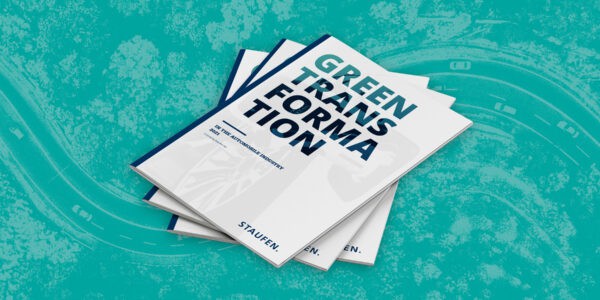
Hirschvogel, an automotive supplier, needs a lot of energy to convert steel and aluminum. Dr.-Ing. Christian Hinsel, Global Head of Sustainability Management and Production System at Hirschvogel, explains in an interview why this is increasingly coming from renewable energy sources and why the change to a “green” company is also well received by the banks.
The Hirschvogel Group, headquartered in Denklingen, Germany, is one of the world’s largest automotive suppliers specializing in the forging and machining of steel and aluminum. Customers include all major automotive manufacturers and their suppliers worldwide. With approximately 6,000 employees at locations in Germany, Poland, China, India, Mexico and the USA, Hirschvogel most recently generated annual sales of 1.2 billion euros.
An expert contribution to the 2023 “Future Industry” study
Inverview with Dr.-Ing. Christian Hinsel, Hirschvogel Holding GmbH
More than three-quarters of the companies surveyed for the current Staufen study still see a great deal of ecological potential. How green is Hirschvogel already?
Christian Hinsel: Hirschvogel has been deeply involved in environmental and social issues for years. We comply with the relevant ISO standards for occupational safety, health, environment and energy management at all our sites. However, we still have some way to go before we are carbon neutral.
How is sustainability organized at Hirschvogel?
Christian Hinsel: As of April 2022, there is a separate Executive Board department for Corporate ESG. This has given the whole issue another decent boost. We have now embedded sustainability in our strategy and are working hard to implement it.
What are Hirschvogel’s goals for decarbonizing its production processes?
This year, for the first time, we worked with senior executives to agree breakthrough decarbonization targets. With the support of the global lean team of our production system, all sites are now implementing decarbonization using the Hoshin Kanri method. The goal: At Hirschvogel, we want to halve our Scope 1 and 2 emissions by 2030.
Do you have an example of an emission reduction measure?
Christian Hinsel: We currently see the greatest potential for internal emissions in the heating processes, which still require a lot of natural gas. An important first step was the purchase of an electrically heated heat treatment system.
As an automotive supplier, we know that decarbonization is currently the number one issue, and we want to ensure that we, together with our customers and business partners, become sustainable along the entire value chain.
Christian Hinsel
Vice President und Global Head of Sustainability Management (ESG) and Production System, Hirschvogel Holding GmbH
In other words, electricity instead of natural gas: What role do renewable energy sources play?
Christian Hinsel: To date, Hirschvogel has purchased all energy sources, i.e., (green) electricity and gas, on the market. Now we are focusing on an energy mix that includes our own and local renewable energy sources. For example, a 5.5-acre solar farm around our company parking lot is in the procurement phase and hall roofs are equipped with photovoltaic modules. We are gradually implementing similar measures in all our other locations, including India, China, and Mexico. In addition to photovoltaics, we are in negotiations with promising wind power projects.
Does your commitment to sustainability have an impact on financing?
Christian Hinsel: Yes, we have just successfully negotiated a bank loan that incorporates ESG indicators into the interest rate mechanisms. If we significantly improve certain environmental and social indicators over the next few years, this will be reflected in the credit margin.
As the Staufen study shows, sustainability assessment is already a criterion in the selection of suppliers for around one in two automotive companies. How does Hirschvogel convince its customers to become “green” suppliers?
Our customers are also increasingly asking about our carbon footprint. We are able to track it and report it on various platforms. As an automotive supplier, we know that decarbonization is currently the number one issue, and we want to ensure that we, together with our customers and business partners, become sustainable along the entire value chain.
more about Sustainability

2021年绿色转型研究报告
当涉及到绿色转型时,没有更多的犹豫——这是行业不得不接受的残酷现实。公司喜欢相信自己比其他行业有优势。然而,尽管他们取得了显著的成功,仍然会面临以下的情况:汽车行业不会在一夜之间演变成一个典型的绿色产业。这是一个漫长的过程,在某种程度上也非常艰难。然而,越来越严格的要求和越来越大的社会压力已经启动了一个进程,这个进程正在逐步加速。
Read more
走向绿色——长期竞争力的机会
Heat records, forest fires, dried-up rivers and lakes – climate change caused by greenhouse gas (GHG) emissions can no longer be ignored. In Germany, industry is responsible for around one-fifth of GHG emissions.
Read more
Study: Future Industry
How the industry is positioning itself for the future! Our new study on the topics of digitalization, efficiency, sustainability and resilience.
Read more
